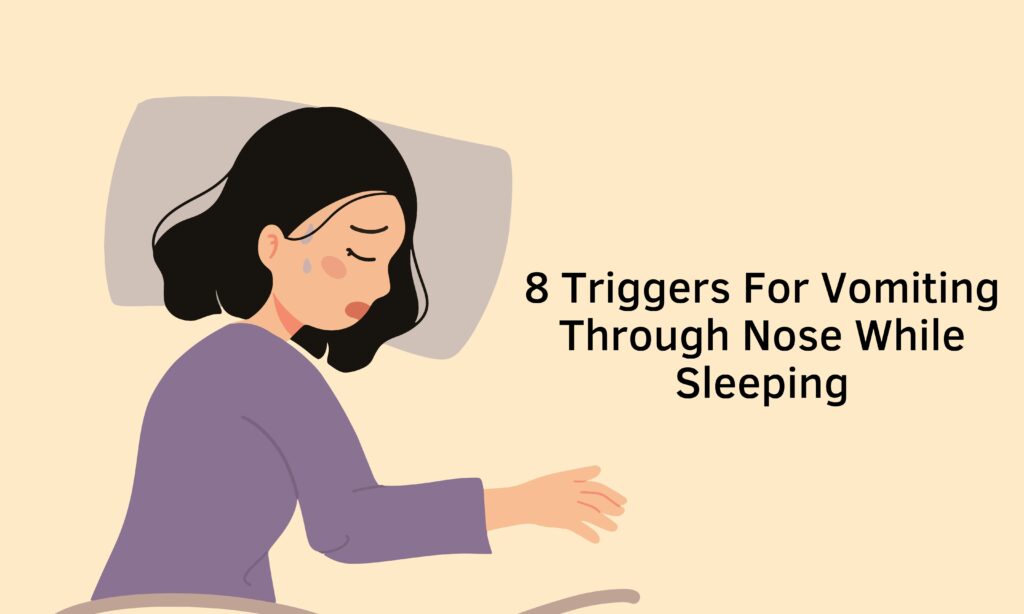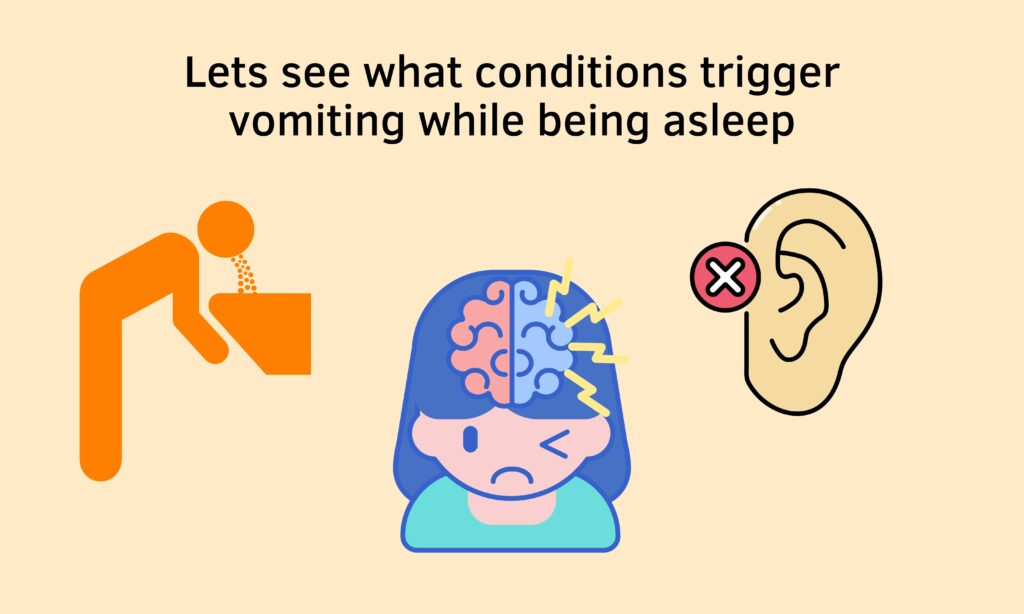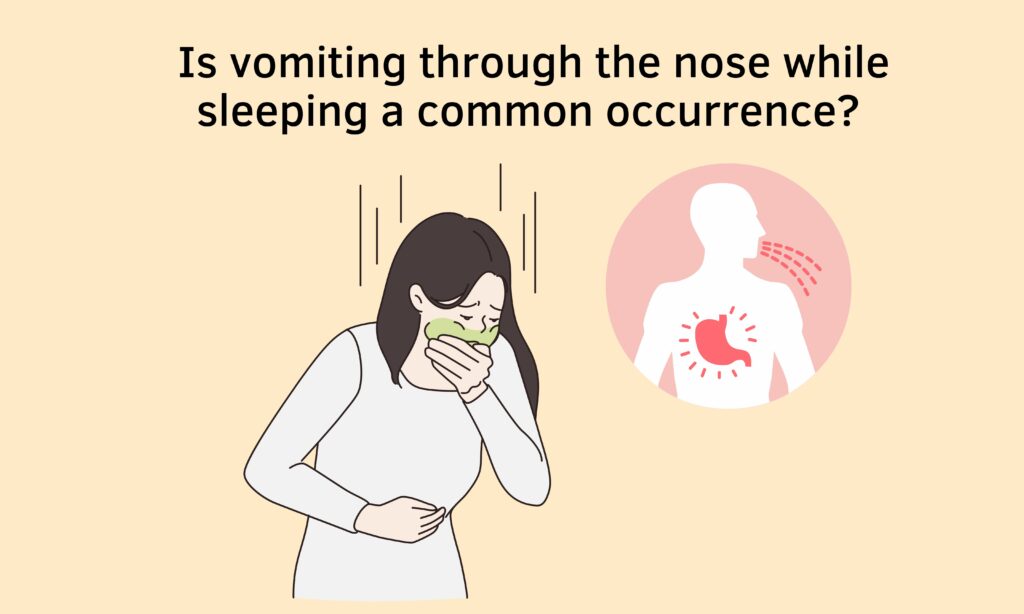
Throwing up through the nose while sleeping can be a frightening and unpleasant experience. It is usually caused by regurgitated stomach contents that enter the nasal cavity and cause irritation and inflammation.
Vomiting through the nose while sleeping is a relatively rare but potentially dangerous occurrence that can happen for a variety of reasons. It can be caused by a number of underlying medical conditions or lifestyle factors, such as acid reflux, pregnancy, alcohol consumption, or medications.
When vomiting occurs during sleep, it can be particularly dangerous because the individual may not be aware of what is happening and could potentially choke on the vomit. In some cases, it may also lead to aspiration pneumonia, a serious infection that can occur when vomit or other foreign matter is inhaled into the lungs.
If you or someone you know experiences vomiting through the nose while sleeping, it is important to seek medical attention right away. Your doctor can help determine the underlying cause of the vomiting and provide appropriate treatment to prevent further episodes. In the meantime, it may be helpful to sleep on your side or with your head elevated to reduce the risk of choking or aspiration.
In summary, throwing up through the nose while sleeping can be caused by a variety of factors, including acid reflux, pregnancy, gastroparesis, alcohol consumption, food poisoning, migraines, obstructive sleep apnea, and anxiety and stress. If you experience this symptom frequently, it is important to speak with your healthcare provider to determine the underlying cause and appropriate treatment.
Lets see what conditions trigger vomiting while being asleep

Throwing up through the nose while sleeping can be a distressing experience that may be caused by a number of underlying conditions. Here are some of the most common conditions that can trigger this symptom:
- Gastroesophageal reflux disease (GERD): GERD is a chronic condition that causes stomach acid to flow back into the esophagus, causing heartburn, nausea, and vomiting. If GERD occurs during sleep, the stomach acid may enter the nasal cavity and cause vomiting through the nose.
- Pregnancy: Pregnant women often experience nausea and vomiting, especially during the first trimester. In some cases, this can lead to throwing up through the nose while sleeping.
- Gastroparesis: Gastroparesis is a condition in which the stomach takes longer than normal to empty its contents. This can cause nausea, vomiting, and regurgitation of stomach contents, which may sometimes enter the nasal cavity during sleep and result in throwing up through the nose.
- Food poisoning: Food poisoning can cause vomiting and diarrhea, which may occur during sleep and result in throwing up through the nose.
- Migraines: Migraines are a type of headache that can cause nausea and vomiting. If a migraine occurs during sleep, vomiting may occur and lead to throwing up through the nose.
- Sleep apnea: Sleep apnea is a condition in which breathing is interrupted during sleep, often due to a blocked airway. This can cause snoring, gasping for air, and in some cases, vomiting through the nose.
- Anxiety and stress: Anxiety and stress can cause nausea and vomiting, which may occur during sleep and result in throwing up through the nose.
- Medication side effects: Some medications can cause nausea and vomiting as a side effect. If these medications are taken before bed, vomiting may occur during sleep and lead to throwing up through the nose.
- Inner ear disorders: Inner ear disorders such as Ménière’s disease and labyrinthitis can cause vertigo and nausea, which may occur during sleep and result in throwing up through the nose.
- Alcohol consumption: Excessive alcohol consumption can lead to vomiting, which may occur during sleep and lead to throwing up through the nose.
It is important to note that throwing up through the nose while sleeping can also occur due to a combination of these factors. In some cases, it may be a sign of a more serious underlying condition that requires medical attention. It is important to speak with a healthcare provider if this symptom occurs frequently or is accompanied by other symptoms such as fever, severe headache, or chest pain.
In summary, throwing up through the nose while sleeping can be caused by a variety of factors, including GERD, pregnancy, gastroparesis, food poisoning, migraines, sleep apnea, anxiety and stress, medication side effects, inner ear disorders, and alcohol consumption. If you experience this symptom frequently or are concerned about an underlying condition, it is important to speak with a healthcare provider for proper evaluation and treatment.
Treatments
If you experience vomiting through your nose while sleeping, it’s important to see a doctor to determine the underlying cause. Treatment options will depend on the specific condition causing the vomiting.
For conditions such as acid reflux, GERD, or hiatal hernia, medications such as proton pump inhibitors or H2 blockers may be prescribed to reduce stomach acid and prevent acid reflux. In severe cases, surgery may be necessary.
For those with sleep apnea, continuous positive airway pressure (CPAP) therapy can help prevent vomiting by keeping the airway open during sleep. Weight loss and other lifestyle changes may also be recommended.
In some cases, vomiting through the nose while sleeping may be a side effect of medication. Your doctor may need to adjust your dosage or prescribe a different medication to alleviate this symptom.
For those with neurological conditions such as Parkinson’s disease or multiple sclerosis, medications and lifestyle modifications can help manage symptoms and reduce the likelihood of vomiting through the nose while sleeping. In some cases, surgical intervention may be necessary.
For individuals with sinus issues, treatment options may include decongestants, nasal sprays, and antihistamines to reduce inflammation and congestion in the sinuses. In severe cases, surgery may be necessary to correct structural issues that contribute to sinus problems.
In rare cases, vomiting through the nose while sleeping may be a symptom of a more serious condition such as a brain tumor or infection. Prompt medical attention is essential in these cases.
Overall, treatment for vomiting through the nose while sleeping will vary depending on the underlying cause. If you experience this symptom, it’s important to speak with a doctor to determine the underlying cause and develop an appropriate treatment plan.
FAQs

Q: Is vomiting through the nose while sleeping a common occurrence?
A: No, vomiting through the nose while sleeping is not a common occurrence. It may be a symptom of an underlying medical condition and should be evaluated by a medical professional.
Q: What are some lifestyle changes that may help prevent vomiting through the nose while sleeping?
A: Depending on the underlying condition, lifestyle changes such as weight loss, avoiding trigger foods, and elevating the head of the bed during sleep may be recommended to help prevent vomiting through the nose while sleeping.
Q: Can certain medications cause vomiting through the nose while sleeping?
A: Yes, some medications can cause this symptom as a side effect. It’s important to speak with your doctor if you experience this symptom while taking medication.
Q: How is vomiting through the nose while sleeping diagnosed?
A: Diagnosis will depend on the underlying condition causing the symptom. Your doctor may order tests such as a sleep study, endoscopy, or imaging tests to determine the cause of the vomiting.
Q: Is vomiting through the nose while sleeping a serious condition?
A: It can be a symptom of a serious condition such as a brain tumor or infection. It’s important to seek medical attention if you experience this symptom to determine the underlying cause and receive appropriate treatment.
Q: Can vomiting through the nose while sleeping be prevented?
A: Prevention will depend on the underlying cause of the symptom. Making lifestyle changes and following a treatment plan recommended by your doctor can help prevent vomiting through the nose while sleeping in some cases.
Q: Can vomiting through the nose while sleeping be a symptom of COVID-19?
A: While vomiting through the nose while sleeping is not a commonly reported symptom of COVID-19, it’s important to be aware of all potential symptoms and seek medical attention if you experience any concerning symptoms.
To Summarize
Throwing up through the nose while sleeping is not a common occurrence, and it may be a symptom of an underlying medical condition. Some potential triggers of this symptom include gastroesophageal reflux disease (GERD), sleep apnea, and neurological conditions. It’s important to seek medical attention if you experience this symptom to determine the underlying cause and receive appropriate treatment.
Depending on the underlying condition causing the symptom, treatment may include medications, lifestyle changes, or surgery. For example, if GERD is the cause, medications to reduce stomach acid production or lifestyle changes such as avoiding trigger foods and losing weight may be recommended. In cases of sleep apnea, treatment may involve using a continuous positive airway pressure (CPAP) machine during sleep.
It’s important to note that vomiting through the nose while sleeping can be a serious condition in some cases. For example, it can be a symptom of a brain tumor or infection. Therefore, it’s crucial to seek medical attention if you experience this symptom to determine the underlying cause and receive appropriate treatment.
In addition to seeking medical attention, there are some lifestyle changes that may help prevent vomiting through the nose while sleeping. These changes may include avoiding trigger foods, losing weight, and elevating the head of the bed during sleep. However, prevention will ultimately depend on the underlying cause of the symptom.
In conclusion, vomiting through the nose while sleeping is not a common occurrence, and it may be a symptom of an underlying medical condition. Seeking medical attention and following a treatment plan recommended by your doctor is crucial to determine the underlying cause and receive appropriate treatment. Making lifestyle changes and following a treatment plan recommended by your doctor may also help prevent this symptom in some cases. It’s important to be aware of all potential symptoms and seek medical attention if you experience any concerning symptoms.